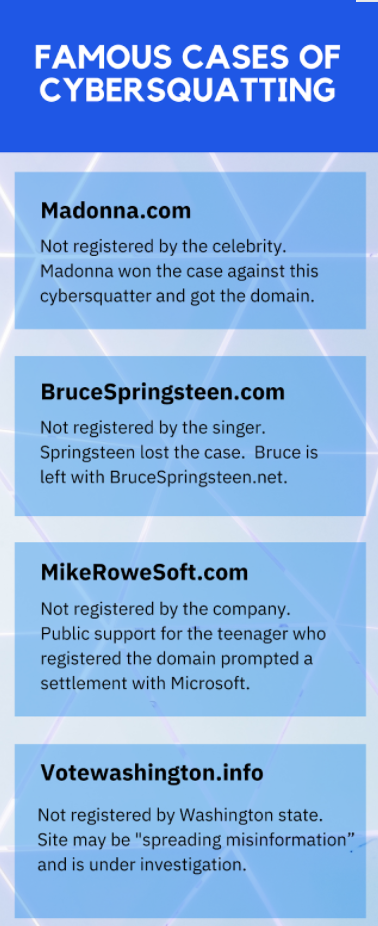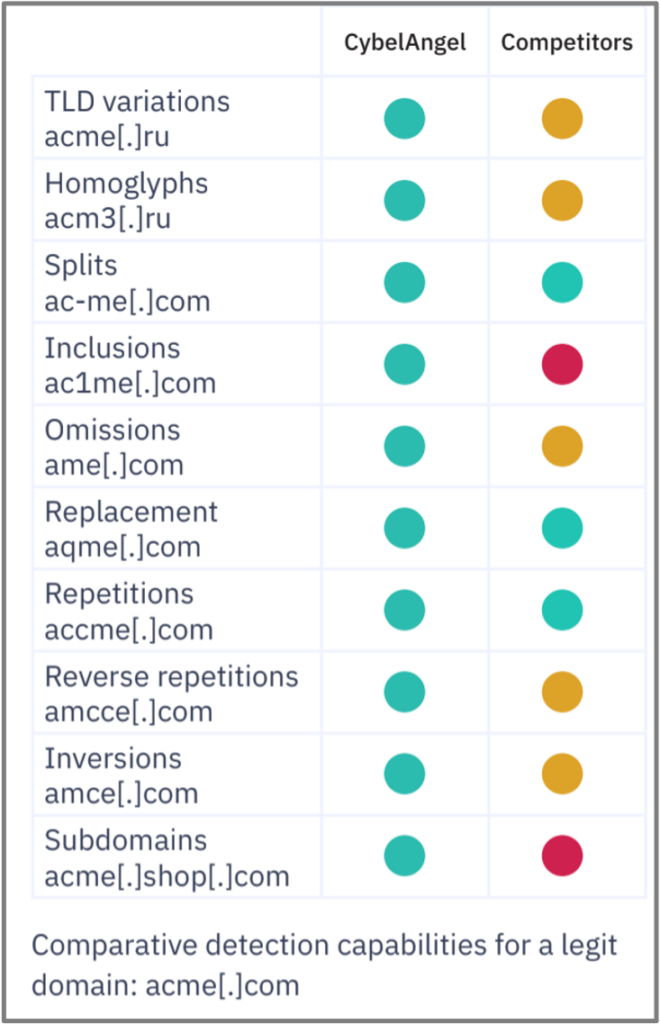What is Cybersquatting? How Can it Damage Your Business?

Table of contents
How malicious domains deceive customers and damage business
What is cybersquatting? Cybersquatting is when someone registers, uses or sells a domain name in bad faith, with the intent to profit from someone else’s trademark. The Domain Name System (DNS) allows unlimited variations of domain names that could successfully be presented as the legitimate domains of targeted organizations. CybelAngel encourages companies to avoid complacency in detecting and monitoring DNS threats. Back in the 1980s and ‘90s when the web was gaining popularity, cybersquatting used to be easy money. Criminals would register a domain of a trademarked product or celebrity, then try to sell that domain to the trademark owner at an exorbitant price. But this easy money was hampered in 1999 when Congress passed the Anticybersquatting Consumer Protection Act (ACPA). The ACPA gives the person who holds a trademark the right to bring a federal lawsuit against someone for cybersquatting on that domain name. Trademark owners will win or lose a case of cybersquatting depending on if they can prove that the cybersquatter intended to profit from the trademarked name.
 Famous cases cybersquatting cases include:
Famous cases cybersquatting cases include:
- Madonna.com, not registered by the celebrity. Madonna won the case against this cybersquatter and got the domain
- BruceSpringsteen.com, not registered by the singer. Bruce Springsteen lost the case against the person who ran a fan club from this domain. Although the domain is no longer active, Bruce still cannot use the domain and is left with BruceSpringsteen.net
- MikeRoweSoft.com, not registered by the software company. Public support for the teenager who registered the domain prompted a settlement with Microsoft who stated, “We take our trademark seriously, but maybe a little too seriously in this case.” As for the settlement with Microsoft, the teen quips on Reddit, “No, I didn’t settle for an Xbox.”
These cases stop being entertaining when one calculates the legal cost and consternation of chasing after a domain that was registered with criminal intent. Deceptive domains hurt a business by deceiving customers, diminishing trust and reputation, and cutting into earnings. However, many trademark owners are unaware of the deceptive domains that exist for their products and services.
Endless possibilities for Your-company.com
Think about your company and your brand: how many products and services do you have trademarked? How many websites could be configured to include
- your brand name plus product name
- your company name plus service name
- your brand name plus city name
When we think of cybersquatting in terms of registered domains that combine branded terms with typical search terms, we see that the possibilities are endless for malicious domains. And this is where CybelAngel comes in.
Domain Protection
According to Forbes, 85% of top retail brands have identified fraudulent domains selling counterfeit versions of their products. Impersonating a business has never been easier. Any ill-intentioned person can set up a copy of a website, or register a domain in order to trick customers, in a matter of minutes.
CybelAnget’s Domain Protection offers a unique approach by combining comprehensiveness and efficiency to deliver:
- Comprehensive Coverage – Using passive and active search to protect your brand from impersonation on all TLDs and subdomains.
- Actionable Incident Reports – Get alerted upon an MX server setup, an IP assignment or content publication on a page.
- Robust Take-Down – Let CybelAngel act on your behalf to swiftly remove malicious domains.
The most comprehensive twist-matching capabilities provides our customers with:
- 1000x superior scanning capabilities
- 4x superior alerting capabilities
- 0 false positives; no additional resources required
CybelAngel experts are standing by to help protect your powerful brands.